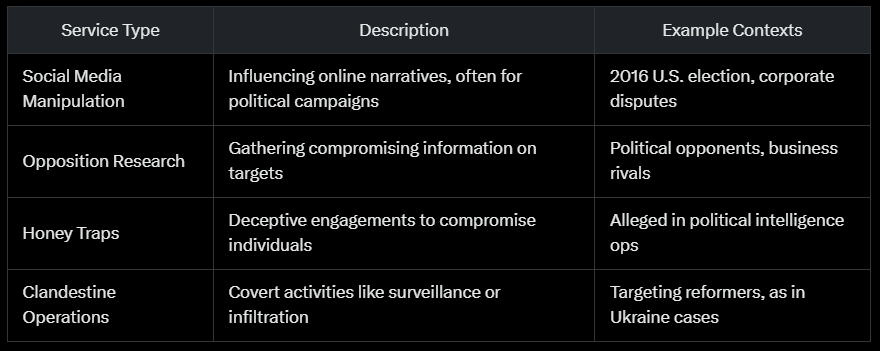Referred to as a “private Mossad,” Psy Group is the kind of private organization that the spy corner of Hollywood drools over. Staffed by former Israeli spies and those with links to the Israeli government, the word “secret” is Psy Group’s very business. Their business operations were unique. Specializing in psychological warfare, their motto was “shape reality,” more specifically they were experts “in innovative influence and intelligence activities tailored to a client’s unique needs1.”
Psy Group deployed bots running fake social media profiles to manipulate unwitting individuals. By utilizing fake websites and bots pretending to be the accounts of real people on platforms such as Facebook, the firm worked on changing people’s perceptions and thus their actions.
Through a tactic known as ‘nudging,’ psychological operations teams achieve changing an individual’s perceptions through very small and minute suggestions. The smaller the better. They are less noticeable and thus avoid setting off alarms for the target. No defenses getting raised leaves the target more susceptible (suggestible) to the uptake of new information and conclusions, regardless of the nature of the nudge.
“They would include threats, intimidation, harassment, covert influence operations, troll farms, fear mongering, blacklists, and espionage. The key was turning thousands of Americans into clandestine Israeli agents to spy on and carry out the operations against their fellow citizens. Secrecy, emphasized Vaknin-Gil, was therefore critical.2”
This makes Psy Group a valuable asset to regimes and organizations with ambitions of shaping narratives, evolving political ideations of entire populations, and even getting these citizens to believe aspects of their reality that are simply not real, while in the same breath denying the actual reality. These psychological operations can weaponize the very desires of their targets against their own best interests and then become cemented in the target’s psyche thanks to the Brandolini Effect. The victims will fight, tooth-and-nail, to defend a lie that they have been convinced of. All while being none the wiser.
“One of the principles for success is keeping our methods of action secret…
Since most of the ministry’s actions are not of the ministry, but through bodies around the world who do not want to expose their connection with the state, we must protect the information whose exposure could harm the battle.3”
—Gilad Erdan, Permanent Representative of Israel to the United Nations ‘20-’24
Psy-Group was established on December 22, 2014, as a private intelligence firm, focusing on covert operations and digital influence campaigns. It was owned by Joel Zamel, an Australian-Israeli businessman with ties to intelligence circles, and led by Royi Burstein, who served as CEO. Burstein, a former lieutenant colonel in the Israel Defense Forces, brought significant military intelligence experience to the firm, shaping its operational approach.
Psy Group’s most notable and debated involvement was in the 2016 U.S. Presidential Election, where it allegedly pitched services to the Trump campaign. According to The New York Times, Rick Gates, a senior Trump campaign official, sought online manipulation plans from the firm. This included a meeting on August 3, 2016, at Trump Tower, attended by Donald Trump Jr., George Nader, and Joel Zamel, among others.
A significant and unexpected detail emerged regarding a post-election payment: George Nader, a close adviser to the United Arab Emirates, paid Joel Zamel up to $2 million. The reasons for this payment are disputed, with one account, as reported by The New York Times, suggesting it was for a presentation on the significance of social media in Trump’s victory. However, Nader and Zamel have provided differing accounts, and the exact purpose remains unclear, fueling ongoing investigations into potential foreign influence.
This payment, part of Mueller’s probe, highlights the complexity of private intelligence firms’ roles in elections, raising questions about legality and ethics. The firm’s activities also extended to other campaigns, such as efforts against Ukrainian reformers, which some reports suggest served Russian interests, adding to the controversy.
Beyond the U.S., Psy Group was involved in a number of global operations. One example was a campaign against BDS (Boycott, Divestment, Sanctions) activists aiming to counter pro-Palestinian movements. This mission is none other than the previously discussed Canary Mission. Another involved corporate legal challenge related to data on computers used by Psy Group in a case against West Face Capital, with the Israeli court blocking data erasure in June 2019.
Canary Mission
Canary Mission is a secret Israeli operation (with an ops center hidden within the United States) that profiles students, professors, and organizations involved in pro-Palestinian activism, often labeling them as antisemitic or terror supporters. While its operators remain anonymous, reports have tied it to Israeli government interests and funding from …
Psy Group ceased operations in February 2018 following the Mueller Report as well as a number of other legal battles like the West Face Capital case. The firm’s activities have contributed to broader discussions on regulating private intelligence firms, especially in “democratic processes,” with evidence leaning toward the need for tighter oversight to prevent foreign interference.
If it isn’t clear yet I assure you that in your future it will be. Intelligence firms, operatives, and operations themselves—military, private, or otherwise—do not simply cease. The informant networks do not go away. The humanint aspects do not magically disappear. And the desire for information, the more private the better, never ends.
Joel Zamel has stayed plenty busy since the of Psy Group. Following the official ceasing of operations, Zamel has gone on to spool up Wikistrat, White Knight Group, and Joel Zamel Investment Group.
Bamford, James. (p. 221) Spyfail: Foreign Spies, Moles, Saboteurs, and the Collapse of America’s Counterintelligence. Twelve, Hachette Book Group, 2023.
^^ p. 207
^^





